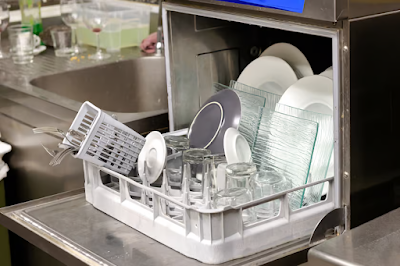New research is questioning the safety of certain chemicals used in dishwashing
detergents after intestinal cell models revealed high doses of components in rinse aids can damage gut health.Commercial dishwashers are designed for maximum efficiency, blasting dirty dishes with detergent and then a rinse aid across two quick cycles lasting a couple of minutes using minimal water. A new study, from a team of international researchers, investigated exactly how much chemical residue is left on dishes after these commercial dishwashers complete a cycle, and what effects these chemicals could have on human gut tissue.
“What’s especially alarming is that in many appliances, there’s no additional wash cycle to remove the remaining rinse aid,” said study lead Cezmi Akdis, director of the Swiss Institute of Allergy and Asthma Research at the University of Zurich. “This means that potentially toxic substances remain on the dishes, where they then dry in place."
Using new organoid technology, which allows researchers to generate three-dimensional cellular structures resembling a variety of human organs, the effects of different detergent chemicals on the gut were studied. The results revealed the chemicals caused distinct alterations to genes, "involved in cell survival, epithelial barrier, cytokine signaling, and metabolism."
Homing in on the specific chemicals causing the damage, the researchers identified the culprit to be alcohol ethoxylates. These chemicals are often used in detergents and surface cleaners to help displace debris from household objects.
Prior research has found alcohol ethoxylates to be non-toxic to human cells and no evidence has been found to suggest alcohol ethoxylates are carcinogenic or mutagenic. This is the first research to indicate alcohol ethoxylates could have a deleterious effect on gut cells.
In terms of residual chemical concentrations on dishes, the researchers found the greatest damage on gut cells came from alcohol ethoxylates in rinse aid at dilutions of 1:10,000. The study notes domestic dishwashers tend to use a little more water and longer washing cycles with dilution factors calculated at 1:80,000. So the researchers are more concerned with short-cycle commercial dishwashers that have dilution factors as small as 1:2,000.
It's important to note that any actual damage to a human gut is still hypothetical at this point. According to Akdis, the effect of alcohol ethoxylates on intestinal cells seen in the research could plausibly trigger a number of inflammatory diseases in humans.
“The effect that we found could mark the beginning of the destruction of the gut’s epithelial layer and trigger the onset of many chronic diseases,” said Akdis. “It is important to inform the public about this risk, since alcohol ethoxylates seem to be commonly used in commercial dishwashers.”
Ultimately the researchers suggest an urgent need for further research into the health effects of alcohol ethoxylates. And while it may be tricky for individuals to evaluate chemical residue on dishes in commercial contexts such as restaurants it is possible to make sure dishes at home are rinsed free of detergent residues.
The new study was published in The Journal of Allergy and Clinical Immunology.
Source: University of Zurich

No comments:
Post a Comment